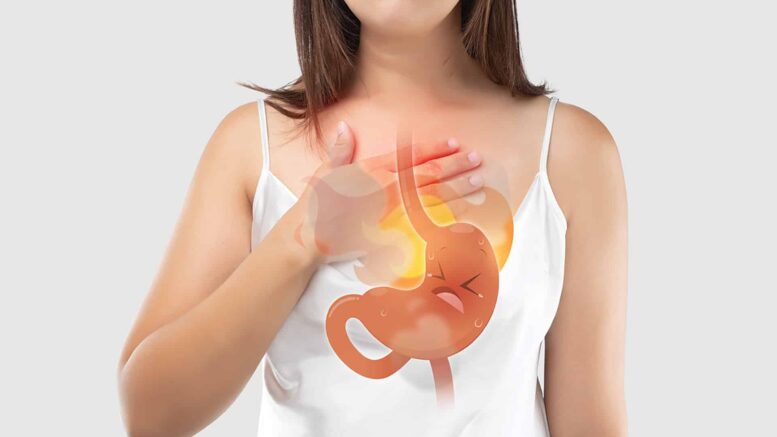Acid Reflux Food Triggers
Ever experienced a burning sensation in your chest or upper stomach?
Thrown off by the gassy bloating in the stomach or the nasty food juices that keep hitting the tongue, some time or the other.
Well, this usually happens during a big hearty meal of greasy and spicy foods.
Certain food items can cause acid reflux if you have weak digestion, suffer from Gastroesophageal reflux disease (GERD) a chronic gastrointestinal condition, or are under some medication.
In this article, we explore the common food triggers that lead to severe acid reflux and heartburn and must be avoided.
Large meals and fatty foods
It’s your friend’s birthday bash and you end up eating a large portion of French fries and other oily preparations. It’s late at night and by the time you reach home, you are very uncomfortable with heartburn.
Fatty foods lead to a relaxed LES and take time for indigestion. They produce more acids that irritate your stomach lining. This may increase your risk for acid reflux, according to the National Institute of Diabetes and Digestive and Kidney Diseases.
Eating large portions tends to stretch your stomach. And that’s why we feel stuffed after a hearty meal. The stomach distention puts pressure on the LES, a bundle of muscles that keeps stomach acids from moving out.
So juices start flowing out, traveling up the esophagus to the mouth. This can happen when eating large amounts of any food that your digestive system cannot handle.
Apart from the above conditions, certain foods other can cause heartburn.
Let’s explore these acid reflux triggers now!
Dairy
Dairy can be a common acid reflux trigger in some people. If you notice that dairy foods cause acid reflux, keep monitoring the symptoms after dairy intake.
If the condition recurs, eliminate dairy products from your diet. You can substitute your diet with coconut, soy, or almond milk products.
- Whole and 2% milk
- Yogurt, smoothies, and cheese
- Flavored milk
- Hot dairy beverages, such as hot chocolate, tea, and coffee
- Dairy ice cream and milkshakes.
Depending on the severity of your condition, you can switch to non-dairy or low-fat products.
Alcohol
Alcohol, particularly red wine, beer and spirits, could be a huge acid reflux trigger. Consumption of alcohol can irritate and inflame the lining of the digestive system.
Different types of alcohol could have varying impacts on individuals. So if you think alcohol is the reason behind your heartburn, try and identify which alcohol does not suit you.
In case you have GERD, try limiting your intake to one glass at a time. Also, as acid reflux aggravates at night, try avoiding alcohol before going to bed.
Caffeine
Most of us are addicted to our daily dose of caffeine in tea or coffee. People suffering from GERD or frequent bouts of acid reflux must refrain from having too much caffeine.
It will result in a burning sensation and discomfort in your digestive tract. And if limiting your caffeine intake does not help, slowly try and eliminate it from your diet completely.
Acidic foods
Does much onion and garlic leave your stomach churning?
Yes, many people witness bouts of heartburn by eating acidic food and juices. That tasty mint candy or the sumptuous tomato soup! Alas, none of these items is suited to your digestive tract.
Your system refuses them by triggering acid reflux or GERD symptoms. These food items include:
- Garlic, onions, and other alliums;
- Mint and mint-flavored foods and drinks
- Citrus fruit, such as oranges, lemons and grapefruit
- Citrus juice, such as orange juice or lime juice
- Tomatoes and tomato products, such as tomato sauce or ketchup
- Pineapple
- Processed foods
- Chocolate
- Carbonated beverages
Limit your intake of acid reflux triggering foods or abstain from them.
Spicy Foods
Spicy foods are a significant GERD trigger. Fiery dishes contain a compound called capsaicin.
As per studies, capsaicin slows the rate of digestion, causing food to sit in your stomach longer, another trigger for GERD and heartburn. It can irritate your digestive pathways, leaving you uncomfortable and uneasy.
On the other hand, one study also suggests that eating spicy foods regularly can improve your acid reflux issues.
Takeaway
Acid reflux food triggers differ from person to person. Although a healthy food choice, A bowl of citrus fruit salad might cause you acid reflux.
For people having a tendency to have acid reflux, eating large meals of fatty food late at night can be very harmful.
Observe what your digestive system digests or rejects. It’s time to go ahead and make healthy food choices!
See Also
Is Pineapple Good for Acid Reflux
